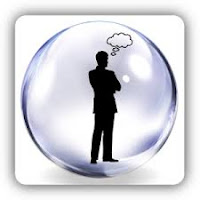Fortunate folks can say, "Wow, I just had a peak experience."
But no one has ever said, "Wow, I just had a peak advertisement."
Ads can grab us, hold us, and charm us; but only experiences have, baked-in, the promise to unleash moments of self-actualization.
That's a prime reason experiential marketers keep pushing the envelope, as Lucasfilm did recently at Comic-Con.
Admit it or not, we all want to be "peakers."
In Religions, Values, and Peak Experiences, Abraham Maslow first described peak experiences as, "rare, exciting, oceanic, deeply moving, exhilarating, elevating experiences that generate an advanced form of perceiving reality, and are even mystic and magical in their effect."
Peak experiences can arise from simple, accidental life events, or be engineered.
Artists, in particular, are specialists in engineering them.
A peak experience of my own took place in 1991, when I worked on the crew that installed Christo and Jeanne-Claude's The Umbrellas.
I was one of 960 fans who labored for five days at minimum wage to erect 1,760 immense yellow umbrellas atop the brown hills that hug an 18-mile stretch of Interstate 5, 60 miles north of Los Angeles.
The morning of The Umbrellas' big reveal, we ran headlong, like kids on Christmas morning, from one giant umbrella to the next to crank them open.
That experience was indeed "exhilarating." But the luminous part came next.
Once the 1,760 umbrellas were open, curious crowds appeared.
Christo and his wife had engineered a wonder.
I saw young mothers gasp and their children chuckle with delight.
I saw crusty ranch hands gape from their jeeps.
I saw migrant workers skip and dance.
I saw a beefy tractor trailer driver stop on the interstate's shoulder, climb from his cab, take a long look at the hills, and burst into sobs at the beauty.
In their aftereffects, Maslow says, peak experiences leave us with the feeling the world's truly perfect.
We turn into "peakers," he says, and long for a chance to repeat the experiences.
Because we all seek perfection.
Admit it or not, we all want to be "peakers."
In Religions, Values, and Peak Experiences, Abraham Maslow first described peak experiences as, "rare, exciting, oceanic, deeply moving, exhilarating, elevating experiences that generate an advanced form of perceiving reality, and are even mystic and magical in their effect."
Peak experiences can arise from simple, accidental life events, or be engineered.
Artists, in particular, are specialists in engineering them.
A peak experience of my own took place in 1991, when I worked on the crew that installed Christo and Jeanne-Claude's The Umbrellas.
I was one of 960 fans who labored for five days at minimum wage to erect 1,760 immense yellow umbrellas atop the brown hills that hug an 18-mile stretch of Interstate 5, 60 miles north of Los Angeles.
The morning of The Umbrellas' big reveal, we ran headlong, like kids on Christmas morning, from one giant umbrella to the next to crank them open.
That experience was indeed "exhilarating." But the luminous part came next.
Once the 1,760 umbrellas were open, curious crowds appeared.
Christo and his wife had engineered a wonder.
I saw young mothers gasp and their children chuckle with delight.
I saw crusty ranch hands gape from their jeeps.
I saw migrant workers skip and dance.
I saw a beefy tractor trailer driver stop on the interstate's shoulder, climb from his cab, take a long look at the hills, and burst into sobs at the beauty.
In their aftereffects, Maslow says, peak experiences leave us with the feeling the world's truly perfect.
We turn into "peakers," he says, and long for a chance to repeat the experiences.
Because we all seek perfection.







